
A different kind of comfort food
Plenty of little things can give you a case of the blues, and some are simply beyond your control. What is within your control? Making some smart moves to improve your physical and mental state when the road gets bumpy. Even though you can’t open your kitchen cabinet door and have a good mood jump out at you, a few items on those shelves can gently help you feel more upbeat. Read on for 18 proven foods that fight depression.
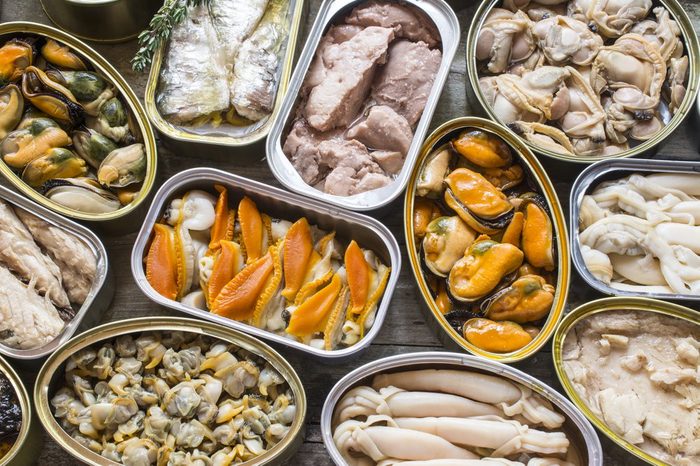
Canned fish
The reasons for eating omega-3 rich fish keep piling up: preventing cancer, fighting acne, and now improving your state of mind. Researchers now know that omega-3s can improve mood problems by influencing the brain’s “happy-making” neurotransmitters and by lessening inflammation that can damage brain cells. A new study published in the American Journal of Clinical Nutrition reported that when middle-aged women with symptoms of mild psychological distress took 1.5 grams of omega-3s (about the amount in a 3-ounce can of salmon) daily for eight weeks, their symptoms improved significantly. If you like sardines, you can get even more mood-boosting omega-3s: A 3-ounce can of sardines packed in sardine oil contains 3.3 grams. Unfortunately, you can’t expect one can of fish to blast you into a sunnier state of mind. Plan on eating a serving of canned fish, especially sardines and herring, several times a week. If you’re not a fish eater, take a daily fish oil supplement instead. Here’s more on why quality canned fish should be a pantry staple.
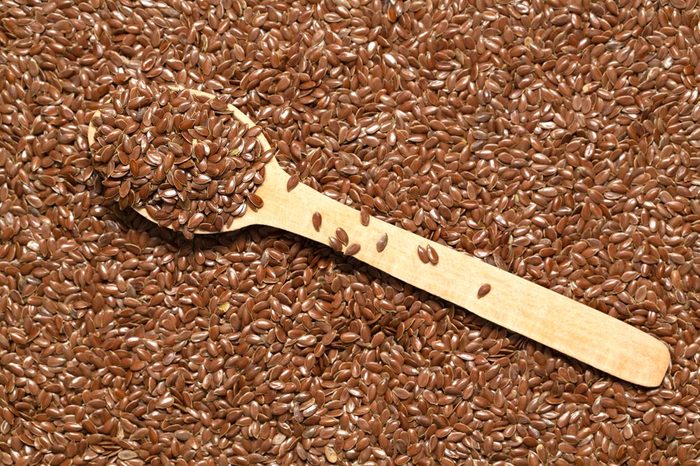
Flaxseeds
Omega-3s aren’t just found in fish. Add depression-fighting benefits to any meal by sprinkling it with flaxseed, one of the plant-based sources of omega-3s. It makes a popular topping for smoothies, cereal, and yogurt. Since these super seeds have hard shells, grind them in a blender or coffee grinder first so the nutrients can be absorbed into your system.
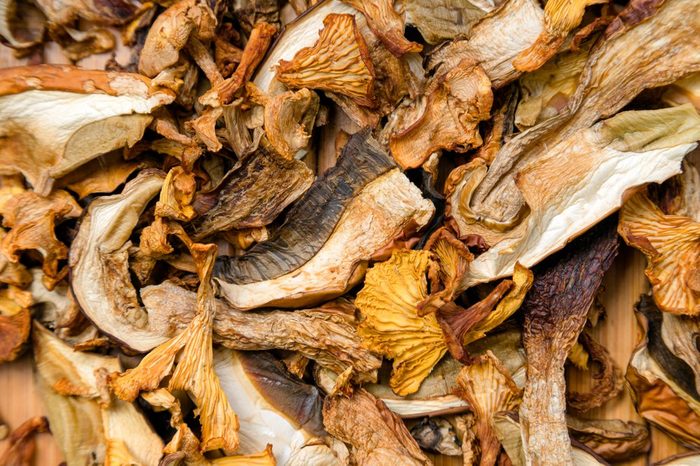
Dried crimini mushrooms
These veggies are a great pantry source of vitamin B6, also called pyridoxine, which helps make the hormone serotonin. Low levels of serotonin are associated with depression. But your mood might not be the only thing affected by a vitamin B6 deficiency. Other symptoms include fatigue and malaise. As many as 50 percent of women don’t get enough; some 15 percent get less than 25 percent of their B6 needs. Getting even 1 milligram less of this vital nutrient can short-circuit your nervous system. What’s more, vitamin B6 deficiencies are linked to depression. Women under 50 need 1.2 milligrams a day; women over 50 need 1.5 milligrams. Men under 50 need 1.3 milligrams; over 50, 1.7 milligrams. These mushroom recipes are filled with health-boosting benefits.
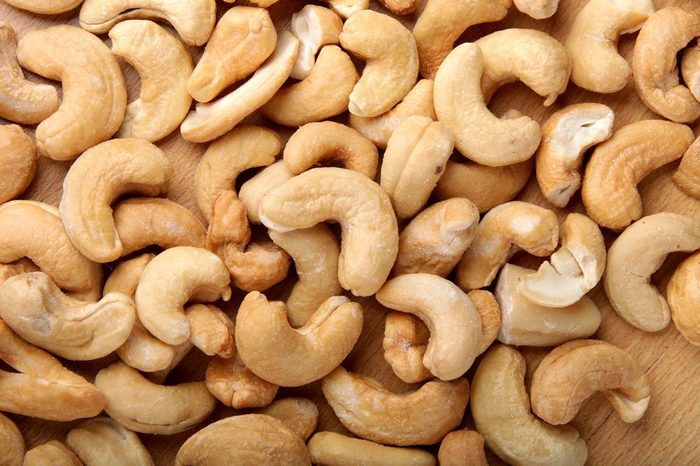
Cashews
Researchers have found that zinc plays a major role in our brain and body’s response to stress. A deficiency in this vital mineral can lead to depression, learning and memory impairments, and aggression. Italian researchers discovered that blood levels of zinc are consistently lower in people with depression. One ounce of dry roasted cashews contains 1.6 mg of your daily intake (8 mg for women, 11 mg for men), and they’re easy to add to meals or snack on throughout the day. Love cashew butter? Here’s your guide to every nut butter out there.
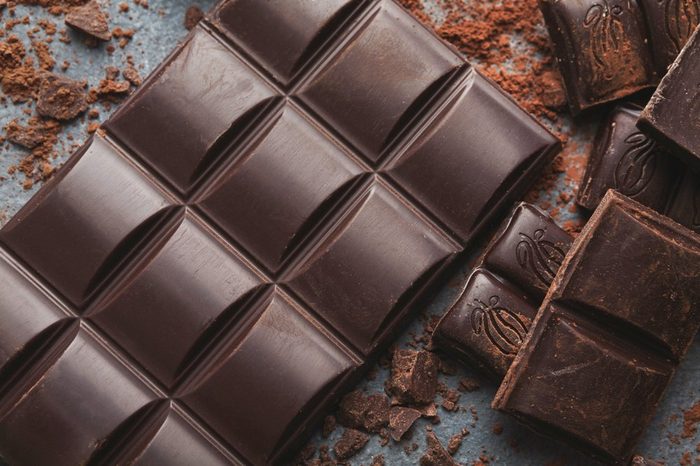
Extra-dark chocolate
Go ahead—reach for a few pieces of extra-dark chocolate the next time you feel a little blue. This delicacy interacts with the brain’s chemical messengers responsible for regulating mood and energy. French scientists recently learned more about its mood-lifting effects: When they gave rats some chocolate extract, the rats passed depression tests with flying colours. (Wonder how scientists figure out whether or not rats are depressed? It’s simple. They put the rodents into a cylinder filled with water. Happy rats try to escape. Unhappy rats don’t. All are rescued.) Also, these yoga moves promise to boost your energy.
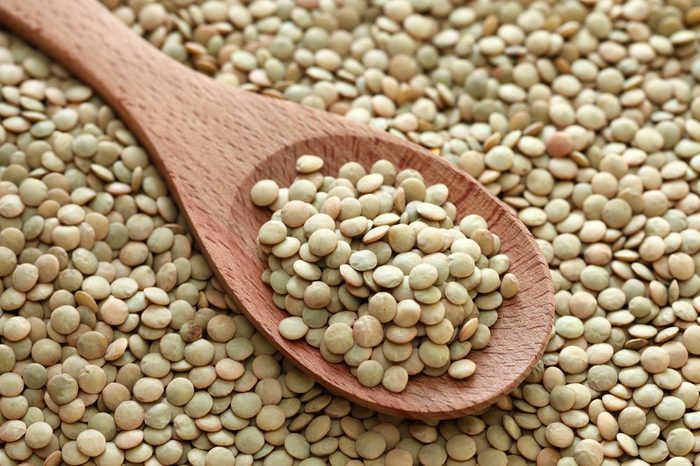
Lentils
Folic acid, called folate when it occurs naturally in food, is the synthetic form of this B vitamin found in supplements and added to fortified foods. And nearly 40 percent of people diagnosed with depression have folic acid deficiencies. When they start eating foods rich in folic acid, guess what? They begin to feel happier. Adults need 400 micrograms a day (women contemplating pregnancy and pregnant women need 600 micrograms). One of the best sources of folate sitting in your pantry: cooked lentils, with 358 micrograms per 1 cup.
For a weekly regular, try our Creamy Red Lentil Soup recipe.
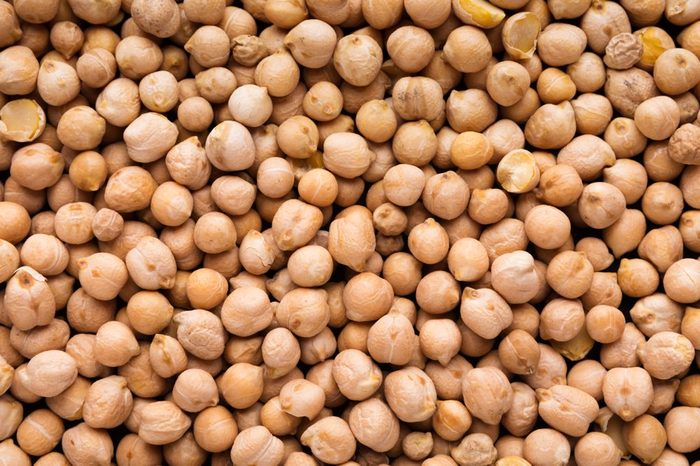
Chickpeas
Chickpeas are a good source of magnesium, and getting enough magnesium impacts your serotonin levels. A deficiency of this mineral has been associated with an increased risk of depression and anxiety. To boost your intake, check out our Vegan Sunchoke and Chickpea Soup recipe.
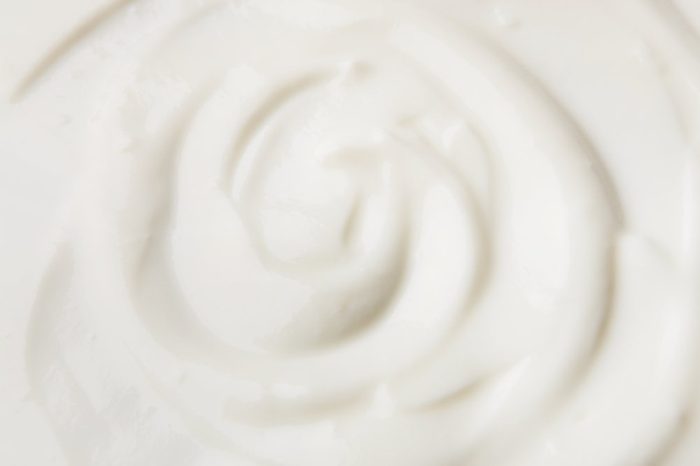
Dairy
Whether you’re choosing a cup of yogurt or glass of milk, you’re treating your body to a dose of tryptophan—that mood-boosting substance we associate with Thanksgiving turkey. “This amino acid converts into serotonin, a feel-good neurotransmitter that gives a sense of positive well being and happiness and takes the edge off the day,” says Libby Mills, MS, RDN, LDN, FAND, spokesperson for the Academy of Nutrition and Dietetics and owner of Dig In Eat Up. Yogurt and milk are two top foods that fight depression because they come packed with calcium and magnesium, which help muscles contract and relax. Mills advises aiming for the recommended three cups of dairy per day. Can’t do dairy? Check out our plant-based milk guide.
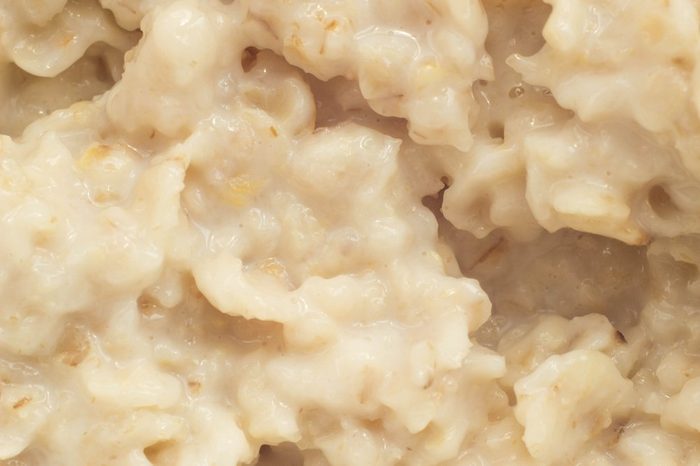
Oatmeal
This ultimate breakfast comfort food is also a mood stabilizer. The carbohydrates in oatmeal elevate your blood sugar levels, therefore boosting your serotonin, says Mills. While any source of sugar—a handful of hard candy, say—will do the same, your body digests those sugars so quickly that your blood glucose quickly spikes and then crashes, wrecking your mood. With a bowl of oatmeal, you also get fibre (4 grams per ½ cup), and that slows down the digestion of carbs. “Slowing down the absorption evens out those blood sugar spikes and valleys,” Mills explains. “So oatmeal will sustain your blood sugar level—and parallel serotonin level—at an even plateau, which minimizes a potential crash and craving for carbs later in the morning.” Try these tricks to instantly turn a bad mood around.

Water
We take plain old water for granted, but it deserves credit as a mood booster, says Mills. “We often overlook how important water is to our ability to feel good,” she observes, “If you’re sleepy, lacking energy, or unable to concentrate, the culprit could be dehydration.” She suggests following the daily recommendations from the National Academies of Sciences, Engineering, and Medicine of 15.5 cups of water per day for men, and 11.5 for women; you can get it from coffee, tea, fluid-filled foods like fruits and veggies, and your tap. “Plain water is best because it requires the least processing by your body, so it’s readily absorbed within 15 to 20 minutes and you quickly feel the effects of being hydrated.” For those who need some flavour, she adds, you could put a pitcher of water in your fridge with cut lemon or lime, or even purchase flavoured seltzers (just make sure the nutrition panel shows 0’s across the board). Find out why you need to drink 8 full glasses of water every day.
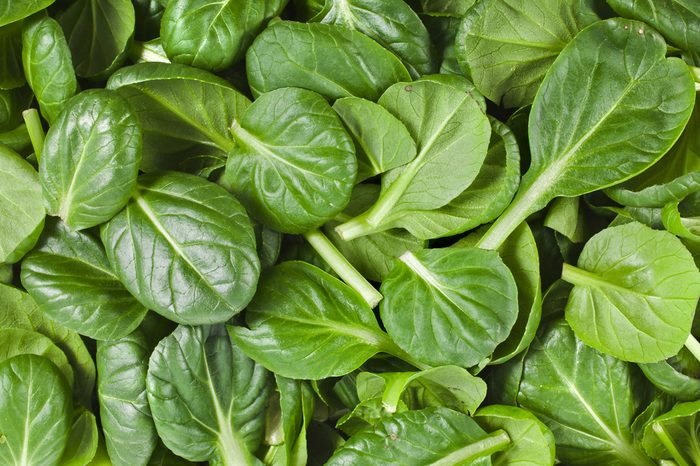
Green vegetables
In addition to blocking cancers and boosting heart health, there’s another reason to binge on veggies: They’re packed with folate, and research links low levels of this B vitamin to depression, reports VeryWellMind. A 2017 paper in the Journal of Psychiatric Research revealed that people who had depression had lower blood levels of folate and got less of the vitamin from their diet compared to people who were not depressed. Researchers aren’t clear on the connection, but it’s possible that a folate deficiency may hamper the metabolism of mood-related neurotransmitters such as dopamine, serotonin, and noradrenaline. You can fill up on feel-good folates by eating more spinach, edamame, avocado, and broccoli. You could also find this mood-boosting nutrient in lentils and beans.
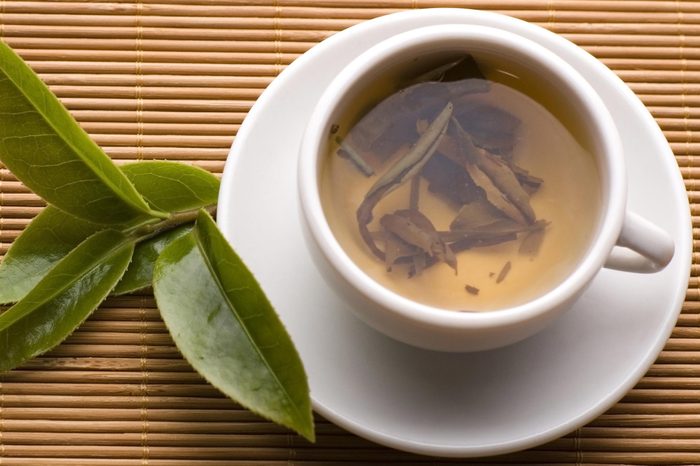
Green tea
We’ve all heard that green tea is good for your health as a powerful source of antioxidants. But this mighty brew can also fight depression and anxiety, according to Anxiety.org. The mood-boosting effect is caused by an amino acid found in tea leaves called theanine, which offers a “relaxation benefit,” Shawn Talbott, PhD, a nutritional biochemist and author of Vigor: 7 Days to Unlimited Energy, Focus, and Well-Being told Everyday Health. “The presence of theanine in green tea is thought to be responsible for the observation that caffeine intake in coffee drinkers (who aren’t getting theanine) is more apt to result in tension as opposed to the ‘relaxed alertness’ more common to tea drinkers,” he explains. Here are 11 more heath benefits of green tea.
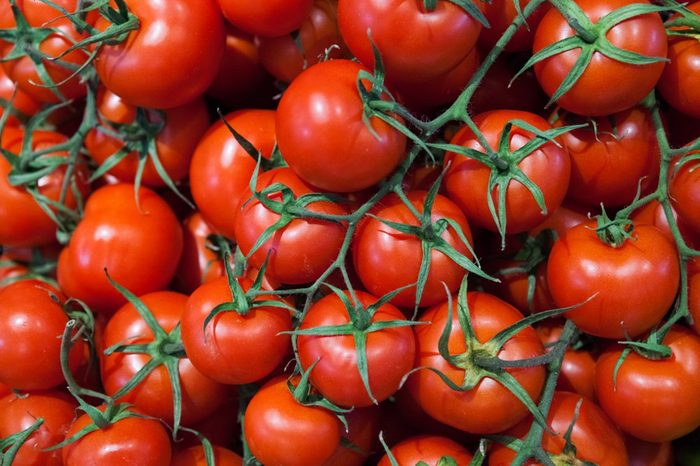
Citrus foods
Minimizing the oxidation in our bodies decreases anxiety and stress, says Mills, so the antioxidant powers of vitamin C could offer real mood-boosting benefits. She recommends citrus fruits as the prime way to get feel-good C, but she adds that bell peppers, strawberries, and tomatoes are also good sources. Regardless of the source, fresh is best. “If your veggies are sautéed or thrown into soup, the heat degrades the vitamin C, and we’re not sure how much is left afterward,” Mills points out. “So fresh citrus fruits or bell peppers and tomatoes in salads will pack the most punch.”
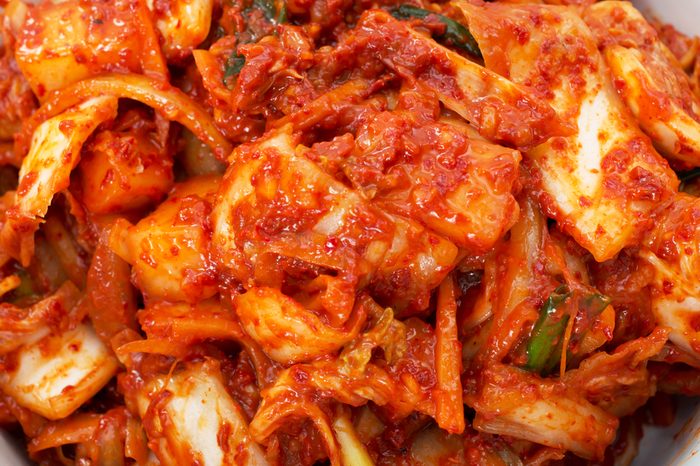
Fermented foods
While the phrase “mood-boosting foods” may summon thoughts of cozy teas and steaming hot cereal, it turns out fermented dishes like kimchi may belong in the same category. Studies on animals have suggested that some yeasts and live bacteria—called probiotics—could help alleviate anxiety and depression, reports Health. Abundant in fermented foods, these healthy bacteria are believed to soothe gut inflammation—and the gut is involved in producing key brain chemicals, such as the feel-good hormone serotonin. Note: these foods are high in natural probiotics.
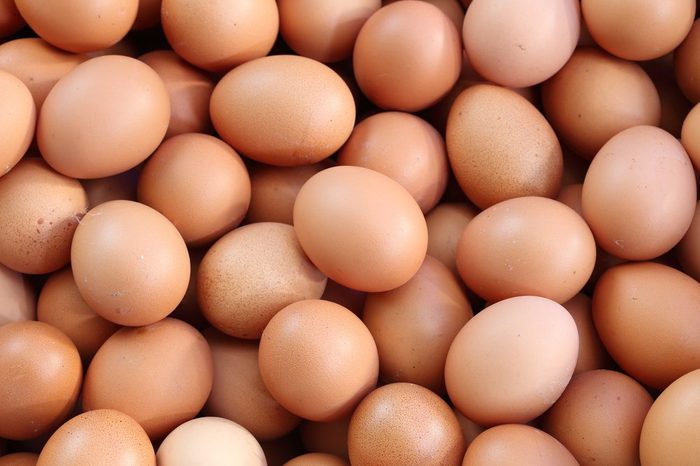
Eggs
When it comes to foods for depression, Mills tells her clients to think zinc. A number of research papers—including this 2017 review in Frontiers in Pharmacology—have explored the link between zinc deficiency and depression. Some people could be low on zinc for a range of reasons, including absorption issues, aging, or even medication interactions. “So if people are walking around a bit depressed, seeking out a food rich in zinc is a great choice.” And one of Mills’ go-to sources is the mighty egg. “Eggs are great for zinc, plus they’re quick and versatile as a breakfast or boiled for an on-the-go snack.”
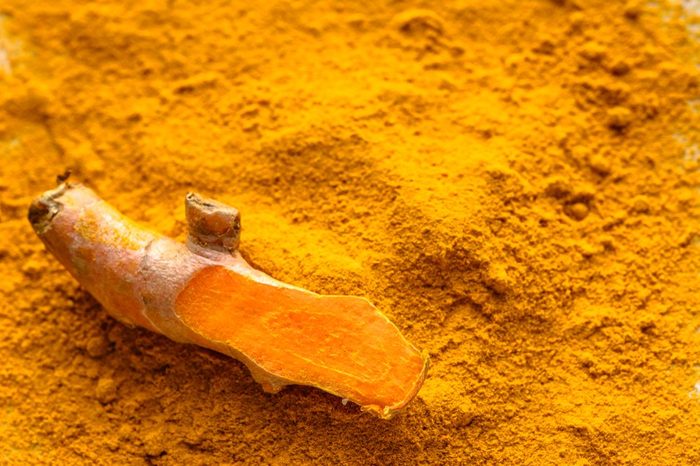
Turmeric
A bright yellow spice that’s gotten a good rep for its health benefits? Turmeric contains a key compound called curcumin, which has anti-inflammatory and antioxidant properties that could lessen anxiety. (Sip on our soothing Turmeric Latte.) A number of studies have found that curcumin may ease anxiety and help keep your brain sharp. One investigation in mice, published in Brain Research, found that a daily dose of curcumin could dramatically lower stress.

Beets
This lowly root veggie can help keep your system in high gear, according to research. “What’s cool about beets is that they have nitric oxide, which is a compound that basically enhances your system’s ability to carry oxygen to all parts of the body,” says Mills. “If you’re not getting enough oxygen it will affect mental clarity and mental performance.” Studies related to athletes—such as this 2017 review in the journal Nutrients—have found beetroot juice to boost efficiency and cardiovascular performance. Next, read up on 8 simple ways to stress less and be happier.
